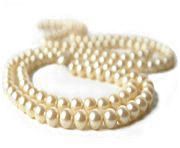The most important relationship I seek to nurture in the treatment room is the one a patient has with their own body. We live in a culture that teaches us to override pain, defer to outside authority, and push through discomfort. Patients often arrive hoping I can “fix” them, but the truth is, we can’t do the work for them. We can offer guidance, insight and support, but healing requires their full participation.
Herbs & Botanicals
Pearl (zhen zhu/zhen zu mu)
What is pearl? What is it used for?
While pearl is not an herb, it is nevertheless a vital component of traditional Chinese medicine. A pearl is actually a precious gemstone, the result of a combination of minerals that forms around a grain of sand or other foreign matter in the shells of oysters and other mollusks.
Although the bulk of a pearl is made of a substance called calcium carbonate, it also contains dozens of amino acids and minerals, including magnesium, zinc, iron, copper, selenium and silicon.
In traditional Chinese medicine, pearl can be administered internally or externally. Internally, pearl is used as part of a tonic to calm the spirit and clear phlegm from the body; other uses include improving oneís eyesight and invigorating circulation. Pearl powder that has been hydrolyzed, or water-soluble, has been shown to lower blood pressure, increase endurance and relieve some of the symptoms of constipation. Externally, pearl is used as a powder to help heal blemishes and other skin problems, and to help the skin from becoming wrinkled and old-looking.
How much pearl should I take?
 The amount of pearl or pearl powder to be used depends on the condition being treated. Externally, it is used as part of a cream. Make sure that the pearl cream you use contains hydrolyzed, dissolvable pearl, which absorbs into the skin easily. If you are taking hydrolyzed pearl powder, 500 mg to one gram per day is the recommended dose.
The amount of pearl or pearl powder to be used depends on the condition being treated. Externally, it is used as part of a cream. Make sure that the pearl cream you use contains hydrolyzed, dissolvable pearl, which absorbs into the skin easily. If you are taking hydrolyzed pearl powder, 500 mg to one gram per day is the recommended dose.
What forms of pearl are available?
Pearl is most often available as a powder or cream. Pearl powder is available at some health food stores and specialty markets, while pearl creams can be found along with some cosmetics and other skin care products.
What can happen if I take too much pearl? Are there any interactions I should be aware of? What precautions should I take?
There are no known drug interactions or adverse side-effects associated with pearl. Several studies have shown that hydrolyzed pearl powder is harmless, and can be taken by anyone without experiencing negative side-effects. As always, however, make sure to consult with a licensed health care provider before taking pearl, pearl powder, or any other dietary supplement or herbal remedy.
References
- Editorial Committee of Chinese Materia Medica. State Drug Administration of China. Chinese Materia Medica. Shanghai: Science and Techonology Press; 1998.
- Lu, G.H., et al. Comparative study on anti-hypertensive effect of zhen zhu mu in patients with essential hypertension. Guizhou Medical Journal. Chinese. 1996; 20:1.
- Teeguarden R. Radiant Health: The Ancient Wisdom of the Chinese Tonic Herbs. New York: Warner Books, 1998, pp. 175-178.
- Zhou S, et al. Pharmacological study on the safety and effectiveness of pearl powder. Zhong Cao Yao 1990; 21(7):313. In Chinese.
- Zhou YN, et al. Effects of a zhen zhu mu in healthy individuals suffering from moderate anxiety disturbances. Journal of Guiyang Medical College 1993;8(4):261.


